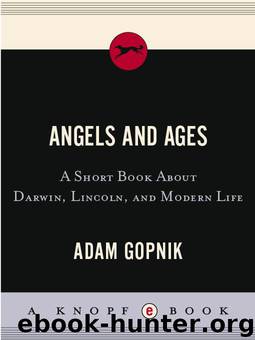Angels and Ages: A Short Book about Darwin, Lincoln, and Modern Life by Adam Gopnik

Author:Adam Gopnik
Language: eng
Format: mobi
ISBN: 9780375891144
Publisher: Knopf Doubleday Publishing Group
Published: 2009-01-26T14:00:00+00:00
These are not just what professors would call rhetorical strategies, things that work. They are a circuit of feelings and implicit themes, of voice, that makes The Origin not just a monument in science but a monument in human thought and feeling. One senses the originality of mind, how the stormy, sarcastic, quick-witted Darwin we know from his notebooks and letters, who worked in “mental rioting,” becomes the narrator we know from his book.
Behind a strong style there is always a human pressure. As Darwin worked on The Origin in the ensuing years, Keynes shows, he was haunted by Annie’s death. In earlier musings, he had written of “the dreadful but quiet war of organic beings going on in the peaceful woods.” But after Annie’s death these words seem to have been inadequate. Now he wrote, “Nothing is easier than to admit in words the truth of the universal struggle for life, or more difficult—at least I have found it so—than constantly to bear this conclusion in mind. . . . We behold the face of nature bright with gladness, . . . we do not see, or we forget, that the birds which are idly singing round us mostly live on insects and seeds, and are thus constantly destroying life.” It is this view of life that illuminates the famous passage at the end of The Origin, where Darwin writes of the “entangled bank [of existence], clothed with many plants of many kinds, with birds singing on the bushes, with various insects flitting about, and with worms crawling through the damp earth,” all produced through the blind agency of natural selection. “Thus, from the war of nature, from famine and death, the most exalted object which we are capable of conceiving, namely, the production of the higher animals, directly follows,” he went on. “There is grandeur in this view of life, with its several powers, having been originally breathed into a few forms or into one; and that, whilst this planet has gone cycling on according to the fixed law of gravity, from so simple a beginning endless forms most beautiful and most wonderful have been, and are being, evolved.” At the end of The Origin Darwin feints toward reassurance, suggesting that life will “tend to progress” over time. But his insistent, immediately adjacent point is that the future in which that progress may happen will be like the past—a vast stretch of geologic time, unstructured by plan or purpose. “We may look with some confidence to a secure future of equally inappreciable length,” he writes, and though the words confidence and secure provide cushioning, the plain sense is that there is no God or plan to interrupt a coming span of time beyond our control or even our imagining. It is the blank prospect that Larkin saw from his high windows: more grains of sand, and more shaking.
After Annie’s death, Darwin abandoned the remaining vestiges of Christian faith, the last preference for even Unitarian theology, and became, essentially, a stoic.
Download
This site does not store any files on its server. We only index and link to content provided by other sites. Please contact the content providers to delete copyright contents if any and email us, we'll remove relevant links or contents immediately.
Fanny Burney by Claire Harman(26582)
Empire of the Sikhs by Patwant Singh(23062)
Out of India by Michael Foss(16837)
Leonardo da Vinci by Walter Isaacson(13292)
Small Great Things by Jodi Picoult(7102)
The Six Wives Of Henry VIII (WOMEN IN HISTORY) by Fraser Antonia(5488)
The Wind in My Hair by Masih Alinejad(5070)
A Higher Loyalty: Truth, Lies, and Leadership by James Comey(4937)
The Crown by Robert Lacey(4791)
The Lonely City by Olivia Laing(4787)
Millionaire: The Philanderer, Gambler, and Duelist Who Invented Modern Finance by Janet Gleeson(4448)
The Iron Duke by The Iron Duke(4337)
Papillon (English) by Henri Charrière(4238)
Sticky Fingers by Joe Hagan(4172)
Joan of Arc by Mary Gordon(4080)
Alive: The Story of the Andes Survivors by Piers Paul Read(4010)
Stalin by Stephen Kotkin(3940)
Aleister Crowley: The Biography by Tobias Churton(3622)
Ants Among Elephants by Sujatha Gidla(3450)
